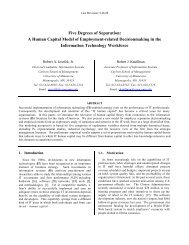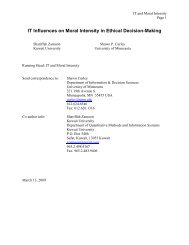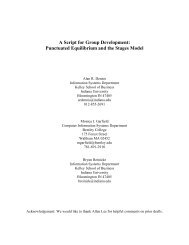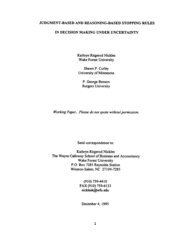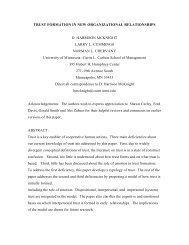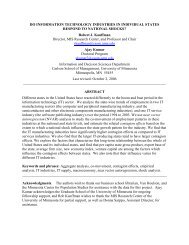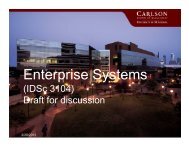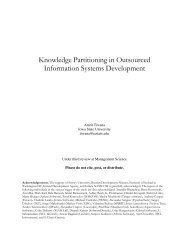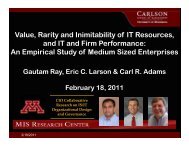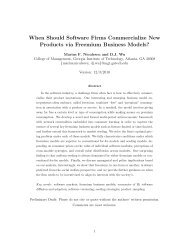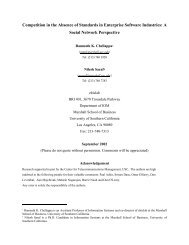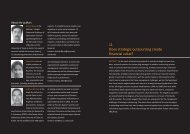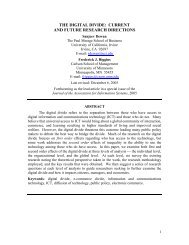Agent-Based Modeling to Inform Online Community Theory and ...
Agent-Based Modeling to Inform Online Community Theory and ...
Agent-Based Modeling to Inform Online Community Theory and ...
You also want an ePaper? Increase the reach of your titles
YUMPU automatically turns print PDFs into web optimized ePapers that Google loves.
Jones et al. 2004). We calculate the benefit from reading messages as a joint function of the quanti-<br />
ty <strong>and</strong> quality of messages that an agent reads. On average, the more messages an agent reads that<br />
match his interest, the greater information benefit he receives, with diminishing returns, because of<br />
information redundancy or information overload. The first graph in Table 2 illustrates the information<br />
access benefit function. The parameters were based on Liang et al.’s (2007) experimental study of re-<br />
commending Internet news articles, which found that an increase from 20 <strong>to</strong> 40 news items caused infor-<br />
mation overload <strong>and</strong> led <strong>to</strong> reduction in user satisfaction. Compared with news items, messages are short-<br />
er <strong>and</strong> less complex. Thus, we increased the value at which marginal benefit starts decreasing from 20<br />
news items <strong>to</strong> 40 messages.<br />
Reading messages takes time <strong>and</strong> effort. We assume that reading cost is proportional <strong>to</strong> the<br />
<strong>to</strong>tal number of messages an agent reads. In addition, having <strong>to</strong> evaluate <strong>and</strong> discard uninteresting<br />
messages increases the cost of reading (Gu et al. 2007). We thus calculate reading cost as a func-<br />
tion that is proportional <strong>to</strong> the <strong>to</strong>tal number of messages the agent views divided by the signal-<strong>to</strong>-<br />
noise ratio, that is, the number of messages that match the agent’s interests divided by the number<br />
of messages that fail <strong>to</strong> match his interests.<br />
Benefit from sharing information. In many online communities, a small proportion of mem-<br />
bers engage in altruistic behaviors, such as answering questions (Fisher et al. 2006) or performing<br />
community maintenance tasks such as promoting <strong>and</strong> policing the site (Butler et al. 2007). Engag-<br />
ing in these altruistic actions can lead <strong>to</strong> positive self-evaluation of competence <strong>and</strong> social accep-<br />
tance because it feels good <strong>to</strong> help others <strong>and</strong> the community (Wasko <strong>and</strong> Faraj 2005). It also pro-<br />
vides opportunities <strong>to</strong> express one’s values related <strong>to</strong> altruistic concerns for others <strong>and</strong> <strong>to</strong> exercise<br />
one’s knowledge <strong>and</strong> skills that might otherwise go unpracticed (Clary et al. 1998). According <strong>to</strong><br />
the collective effort model (Karau <strong>and</strong> Williams 1993), intrinsic benefits from contributing <strong>to</strong><br />
group outcomes decrease if members believe that (1) the group is large or (2) others are already<br />
contributing, both of which make their help less necessary. On the other h<strong>and</strong>, intrinsic benefits<br />
14



